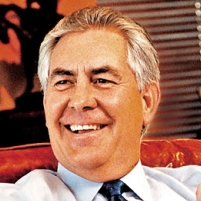Exxon Exports Fracking to Russia…and Opens Gulf of Mexico to Russians
Thursday, September 01, 2011
 Exxon CEO Rex Tillerson (photo: celsias.com)
Exxon CEO Rex Tillerson (photo: celsias.com)
No shortage of potential controversy and trouble surrounds Exxon Mobil’s latest international oil venture involving a Russian state-run company.
On the surface, this is a story of a U.S.-based company making a deal to extract fossil fuels abroad. However, there are two disturbing elements to the contract. It will give the Russian government a stake in oil drilling operations in the Gulf of Mexico and along the Texas coast, and it will share the controversial technology known as hydraulic fracturing (or fracking) with the Russians. Fracking entails injecting millions of gallons of chemicals, sand or fluids into a well to crack open the rocks and allow easier access to natural gas deposits. Unfortunately, unregulated fracking has alarming consequences that include polluting water supplies and, during the disposal of the wastewater from fracking, possibly causing earthquakes.
For a little more than $2 billion, Exxon has won the right to explore Russia’s inhospitable Kara Sea, which is thick with ice but holds enormous possibilities for oil and natural gas. Previously considered inaccessible, the Kara Sea reserves appear to be opening up as a result of the melting of sea ice caused by global warming.
Exxon’s partner in the deal is OAO Rosneft, which was negotiating a similar arrangement with BP. But the British oil giant lost its opportunity to finalize a lucrative contract with Russian officials. Exxon’s victory also represents defeat for Chevron, which wanted in on the Kara oil grab.
There is uncertainty, however, for Exxon. Even if the Kara Sea has as much oil as is believed (perhaps on par with the North Sea), extracting it could prove costly and risky. And it is possible that the frozen ocean rests atop more natural gas than oil, which could lessen the payout for America’s largest corporation.
Rosneft hopes to gain from Exxon the know-how into hydraulic fracturing, as well as deep-water drilling. Drilling in Russia is expected to begin in 2015.
- David Wallechinsky, Noel Brinkerhoff
Exxon Wins Arctic Deal, Gives Russia U.S. Access (by Russell Gold, Greg White and Guy Chazan, Wall Street Journal)
Exxon Reaches Arctic Oil Deal With Russians (by Andrew Kramer, New York Times)
Exxon Forms Rosneft Alliance for Arctic Reserves, Gulf of Mexico (by Stephen Bierman and Ilya Khrennikov, Bloomberg)
Arkansas Suspends Drilling of Injection Wells after Earthquake Swarm (by David Wallechinsky and Noel Brinkerhoff, Allgov)
4 Political Concepts Ruined by Their Boring Names (by David Wallechinsky, AllGov)
- Top Stories
- Unusual News
- Where is the Money Going?
- Controversies
- U.S. and the World
- Appointments and Resignations
- Latest News
- Can Biden Murder Trump and Get Away With it?
- Electoral Advice for the Democratic and Republican Parties
- U.S. Ambassador to Greece: Who is George Tsunis?
- Henry Kissinger: A Pre-Obituary
- U.S. Ambassador to Belize: Who is Michelle Kwan?






Comments